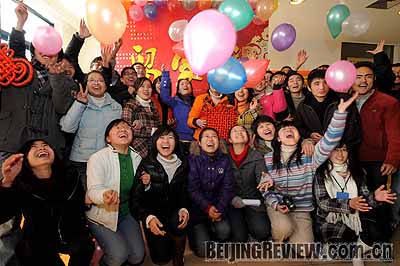|
|
 |
|
STUDENT DILEMMA: Despite the rapid development of China's higher education system, the falling percentage of rural college students to the total undergraduate population is causing concern (XU YU) |
Insensitive Employers
Though it was still the Spring Festival, the most important Chinese event for family reunions, a large number of migrant workers from rural areas began to rush to Nanjing, capital of east China's Jiangsu Province, on the fifth day of the first month of the lunar New Year, trying to grab the first job opportunity that came along. However, in contrast to their enthusiasm, some employers seemed a bit indifferent to the workers, claiming that they would be available only after the holiday.
The global economic downturn has impacted many industries in China, making life extremely difficult for migrant workers. The state has implemented measures to encourage job creation. But if employers take such an uncaring attitude, how can we expect the employment problem to be solved?
Helping migrant workers should not just be lip service. The job-thirsty workers are going to cities earlier than usual because they know work is difficult to get this year. Why don't companies and government agencies that are still able to provide jobs respond more actively to the workers during this difficult period?
China Youth Daily
Tolerance Needed
At a work conference of the local Urban Management Bureau in January, a vice mayor of Guangzhou, Guangdong Province, expressed his hope that urban management officers could become friends of all local residents.
However, the vice mayor in his speech also demanded urban management officers to maintain a tough stance when dealing with unlicensed street peddlers. Maybe this policy alone will never make these officers popular.
Urban management officers and unlicensed street traders, mostly unemployed migrant workers and urban layoffs who are financially unable to afford a taxed booth in regular markets, have been playing cat and mouse for many years. But so far even tough measures have failed to make the streets free of hawkers.
Many unlicensed street peddlers depend on their stands for survival, and low-income earners largely rely on their cheap commodities. It's a case of supply and demand.
Why don't urban management officers try to do something to help those struggling street traders rather than dispersing them? For example, they can offer the traders water and electricity services and vocational training to make them more efficient. Having a system where roadside stands are in good condition and well managed will create a more harmonious environment for residents across the income scale. Only by contributing to this process will urban management officers become better liked.
Peninsula City Daily
Level the Playing Fields
According to recent media reports, students from rural areas now make up only 17.7 percent of China's total undergraduate population, compared with 30 percent in the 1980s.
This finding has greatly shocked the nation, especially against the background that official statistics show farmers' income has remarkably increased over the past 30 years. Then what is keeping rural children from higher education?
During the process of urbanization, some former rural residents have transformed their status to urban residents. This undoubtedly reduces the percentage of rural college students. But more important reasons are extremely high tuition fees and the worsening employment situation for college graduates. As a result, most rural students opt out of higher education.
Education is expected to boost social equality, because it creates a level playing field for people from different social classes to have similar opportunities. But China's current education seems to focus more and more on students from well-off urban families, while comparatively less rich rural students are more and more marginalized.
If the situation remains, it will inevitably entrench the vicious circle where the poor get poorer and the rich get richer. This is really a dangerous state of affairs.
Guangzhou Daily
Longer School Holidays
In east China's Yantai, Shandong Province, some college students enjoyed a 50-day winter holiday this year. In northwestern Gansu Province, local colleges also gave their students a 45-day break before the spring semester. To prepare for the long holiday, most of them completed their classwork of the previous semester ahead of time.
Generally, Chinese schools' winter holidays last no more than 30 days.
Schools that carried out the new holiday policy explained that the practice was designed to save energy.
The long break undoubtedly helps to save coal and electricity for heating purposes. It also gives students more time for their holiday internships. But the significance does not end there.
The traditional winter holiday usually coincides with the Spring Festival travel peak. Pressure on the railway system is obviously huge when millions of college students choose to travel home and back to school during this period. Therefore, if colleges could start the new semester after the Spring Festival travel peak by extending the winter holiday, it would be beneficial to both students and the railways.
Dazhong Daily | 